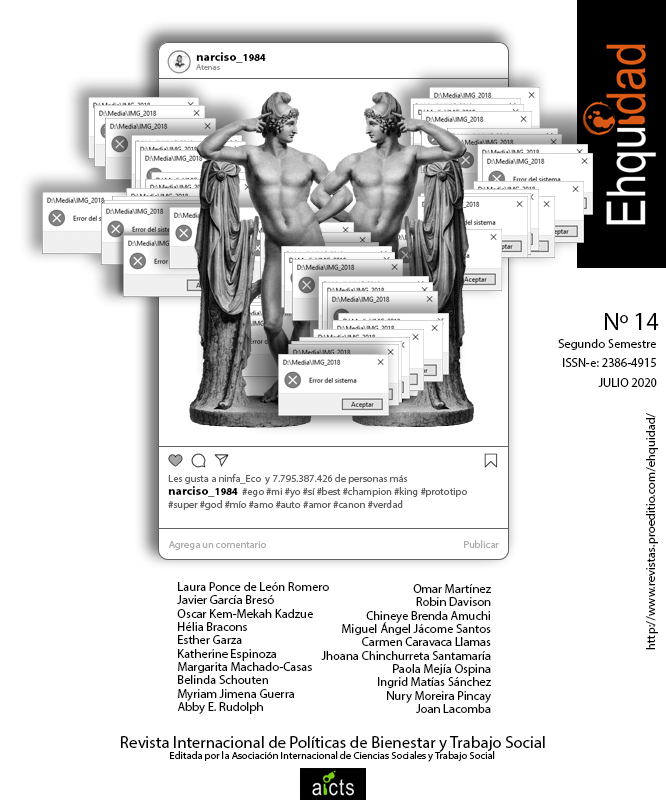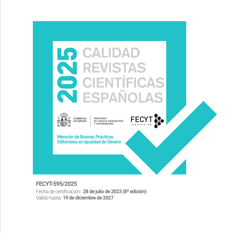Consentimiento informado para la investigación filogenética del VIH: un estudio de caso sobre individuos que viven con el VIH en una zona urbana que fueron contactados para la participación en un estudio sobre el VIH
DOI:
https://doi.org/10.15257/ehquidad.2020.0015Palabras clave:
Epidemiología del VIH, estigma, consentimiento informado, divulgación, filogeniaResumen
Introducción: Los análisis filogenéticos pueden proporcionar información sobre la dinámica de transmisión del VIH. Las diferencias a nivel nacional y estatal en las leyes de criminalización y divulgación del VIH y los avances en la secuenciación de la próxima generación podrían afectar los riesgos percibidos del estudio. Métodos: Presentamos las tasas de exclusión voluntaria del estudio y las razones proveídas durante la inscripción para un estudio realizado en Boston (6/2017-8/2018). Resultados: De los 90 pacientes que se acercaron para participar, 45 no dieron su consentimiento para participar. Las razones para no participar incluyeron la falta de voluntad para discutir su estado en relación con el VIH, preocupaciones de privacidad y confidencialidad, desinterés y falta de tiempo. Conclusiones: Dadas las bajas tasas de participación y las preocupaciones relacionadas con la revelación del estado serológico con respecto al VIH, la privacidad y la confidencialidad, estas preguntas permanecen (1) ¿se debe requerir el consentimiento informado para todos los análisis filogenéticos, incluyendo la información anónima y datos vigilancia? (2) ¿qué pasos adicionales pueden tomar los investigadores para proteger la privacidad de las personas, particularmente en contextos donde el VIH es criminalizado o ha habido casos civiles / criminales que investigan la transmisión del VIH? Y (3) ¿qué papel pueden desempeñar los miembros de la comunidad para minimizar los riesgos potenciales, particularmente para los más marginados? Estas preguntas requieren aportes tanto de investigadores como de miembros de la comunidad que viven con el VIH/SIDA.
Descargas
Citas
Abecasis, A. B., Pingarilho, M., & Vandamme, A.-M. (2018). Phylogenetic analysis as a forensic tool in HIV transmission investigations. Aids, 32(5), 543-554.
Audelin, A. M., Cowan, S. A., Obel, N., Nielsen, C., Jørgensen, L. B., & Gerstoft, J. (2013). Phylogenetics of the Danish HIV epidemic: the role of very late presenters in sustaining the epidemic. JAIDS Journal of Acquired Immune Deficiency Syndromes, 62(1), 102-108.
Chan, P. A., Hogan, J. W., Huang, A., DeLong, A., Salemi, M., Mayer, K. H., & Kantor, R. (2015). Phylogenetic Investigation of a Statewide HIV-1 Epidemic Reveals Ongoing and Active Transmission Networks Among Men Who Have Sex With Men. Jaids-Journal of Acquired Immune Deficiency Syndromes, 70(4), 428-435. Retrieved from ://WOS:000364316300014
Chan, P. A., Kazi, S., Rana, A., Blazar, I., Dejong, C. C., Mayer, K. H., . . . Kantor, R. (2013). Short communication: new HIV infections at Southern New England academic institutions: implications for prevention. AIDS Res Hum Retroviruses, 29(1), 25-29. doi:10.1089/AID.2012.0130
Chan, P. A., Tashima, K., Cartwright, C. P., Gillani, F. S., Mintz, O., Zeller, K., & Kantor, R. (2011). Short communication: Transmitted drug resistance and molecular epidemiology in antiretroviral naive HIV type 1-infected patients in Rhode Island. AIDS Res Hum Retroviruses, 27(3), 275-281. doi:10.1089/aid.2010.0198
Coltart, C. E. M., Hoppe, A., Parker, M., Dawson, L., Amon, J. J., Simwinga, M., . . . Ethics in, H. I. V. P. W. G. (2018). Ethical considerations in global HIV phylogenetic research. Lancet HIV, 5(11), e656-e666. doi:10.1016/S2352-3018(18)30134-6
Corbie-Smith, G., Wynn, M., Richmond, A., Rennie, S., Green, M., Hoover, S. M., . . . Nisbeth, K. S. (2018). Stakeholder-driven, consensus development methods to design an ethical framework and guidelines for engaged research. PLoS ONE, 13(6), 1-12. doi:10.1371/journal.pone.0199451
Dennis, A. M., Herbeck, J. T., Brown, A. L., Kellam, P., de Oliveira, T., Pillay, D., . . . Cohen, M. S. (2014). Phylogenetic studies of transmission dynamics in generalized HIV epidemics: An essential tool where the burden is greatest? JAIDS Journal of Acquired Immune Deficiency Syndromes, 67(2), 181-195.
Dennis, A. M., Hué, S., Hurt, C. B., Napravnik, S., Sebastian, J., Pillay, D., & Eron, J. J. (2012). Phylogenetic insights into regional HIV transmission. AIDS (London, England), 26(14), 1813.
Fisher, M., Pao, D., Brown, A. E., Sudarshi, D., Gill, O. N., Cane, P., . . . Sabin, C. (2010). Determinants of HIV-1 transmission in men who have sex with men: a combined clinical, epidemiological and phylogenetic approach. Aids, 24(11), 1739-1747.
Forbes, A. (1996). Mandatory name-based reporting: impact and alternatives. AIDS Policy Law, Bonus Report, 1-4. Retrieved from https://www.ncbi.nlm.nih.gov/pubmed/11654491
Frentz, D., Wensing, A. M., Albert, J., Paraskevis, D., Abecasis, A. B., Hamouda, O., . . . Schmit, J.-C. (2013). Limited cross-border infections in patients newly diagnosed with HIV in Europe. Retrovirology, 10(1), 36.
Grabowski, M. K., Lessler, J., Redd, A. D., Kagaayi, J., Laeyendecker, O., Ndyanabo, A., . . . Mueller, A. C. (2014). The role of viral introductions in sustaining community-based HIV epidemics in rural Uganda: evidence from spatial clustering, phylogenetics, and egocentric transmission models. PLoS medicine, 11(3), e1001610.
Grabowski, M. K., & Redd, A. D. (2014). Molecular tools for studying HIV transmission in sexual networks. Current Opinion in HIV and AIDS, 9(2), 126-133.
HIV test; informed consent; disclosure of results or identity of subject of test, Chapter 111 C.F.R.
HIV test; informed consent; disclosure of results or identity of subject of test, § 70F.
Hué, S., Clewley, J. P., Cane, P. A., & Pillay, D. (2004). HIV-1 pol gene variation is sufficient for reconstruction of transmissions in the era of antiretroviral therapy. Aids, 18(5), 719-728.
Hué, S., Pillay, D., Clewley, J. P., & Pybus, O. G. (2005). Genetic analysis reveals the complex structure of HIV-1 transmission within defined risk groups. Proceedings of the National Academy of Sciences of the United States of America, 102(12), 4425-4429.
Lazzarini, Z., Galletly, C. L., Mykhalovskiy, E., Harsono, D., O’keefe, E., Singer, M., & Levine, R. J. J. A. j. o. p. h. (2013). Criminalization of HIV transmission and exposure: research and policy agenda. 103(8), 1350-1353.
Mehta, S. R., Wertheim, J. O., Brouwer, K. C., Wagner, K. D., Chaillon, A., Strathdee, S., . . . Murrell, B. (2015). HIV Transmission Networks in the San Diego–Tijuana Border Region. EBioMedicine, 2(10), 1456-1463.
Mutenherwa, F., Wassenaar, D. R., & de Oliveira, T. J. D. w. b. (2018). Ethical issues associated with HIV phylogenetics in HIV transmission dynamics research: A review of the literature using the Emanuel Framework.
Wertheim, J. O., Brown, A. J. L., Hepler, N. L., Mehta, S. R., Richman, D. D., Smith, D. M., & Pond, S. L. K. (2014). The global transmission network of HIV-1. Journal of Infectious Diseases, 209(2), 304-313.
Wolf, L. E., Dame, L. A., Patel, M. J., Williams, B. A., Austin, J. A., & Beskow, L. M. (2012). Certificates of confidentiality: legal counsels' experiences with and perspectives on legal demands for research data. J Empir Res Hum Res Ethics, 7(4), 1-9. doi:10.1525/jer.2012.7.4.1













